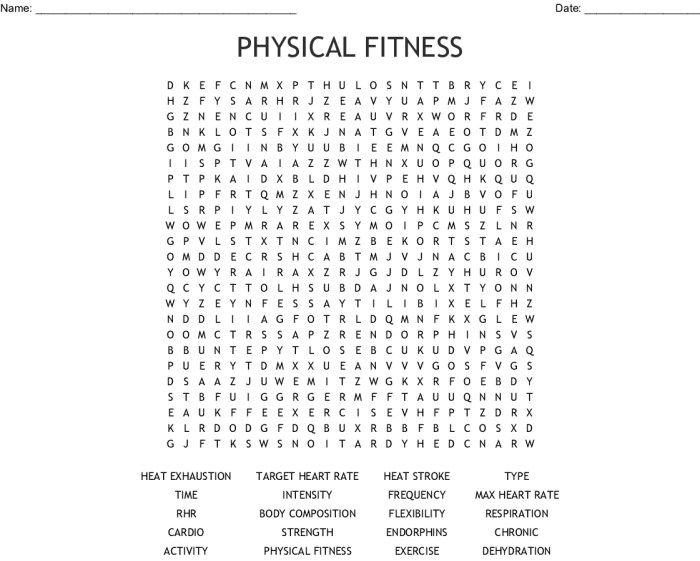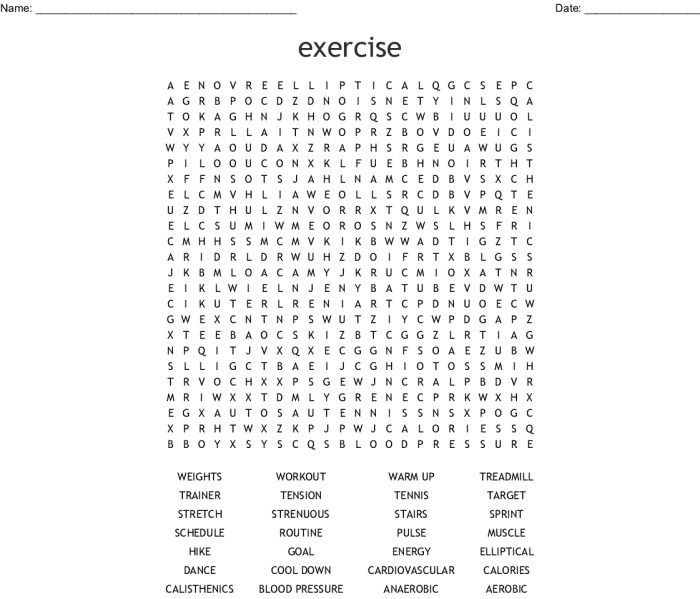Embark on an enlightening journey with our comprehensive guide to physical fitness word search answers. Dive into the world of physical fitness, unraveling the secrets of maintaining a healthy and active lifestyle through the engaging medium of word searches.
Physical fitness word searches are not just a pastime but a gateway to understanding the importance of physical activity, the benefits it offers, and the vocabulary associated with it.
Physical Fitness Word Search
Physical fitness word searches are a type of puzzle that can be used to improve vocabulary and knowledge of physical fitness terms. They are also a fun way to learn about different aspects of physical fitness, such as exercises, equipment, and nutrition.
The history of physical fitness word searches can be traced back to the early 1900s, when they were first used in physical education classes as a way to teach students about the different components of fitness. Today, physical fitness word searches are still used in schools, as well as in fitness centers, gyms, and other settings.
Common Physical Fitness Terms Used in Word Searches
Some of the most common physical fitness terms used in word searches include:
- Aerobic exercise
- Anaerobic exercise
- Body composition
- Cardiovascular fitness
- Flexibility
- Muscular strength
- Muscular endurance
- Nutrition
- Physical activity
- Rest
- Warm-up
- Cool-down
Types of Physical Fitness Word Searches

Physical fitness word searches are a fun and engaging way to learn about different aspects of physical fitness. There are many different types of physical fitness word searches, each with its own unique benefits and challenges.
Themed Word Searches
Themed word searches are designed around a specific topic, such as types of exercise, muscle groups, or fitness equipment. These word searches can be a great way to learn more about a particular topic while also having fun.
For example, a word search about types of exercise might include words like “running,” “swimming,” “cycling,” and “yoga.” A word search about muscle groups might include words like “biceps,” “triceps,” “quadriceps,” and “hamstrings.” A word search about fitness equipment might include words like “treadmill,” “elliptical,” “weight bench,” and “dumbbells.”
Difficulty Levels
Physical fitness word searches come in a variety of difficulty levels, from easy to challenging. Easy word searches are typically smaller and have fewer words to find. Challenging word searches are larger and have more words to find, and they may also include more difficult words.
The difficulty level of a word search can be a good indicator of how long it will take to complete. Easy word searches can be completed in a few minutes, while challenging word searches may take several hours or even days to complete.
Printable Word Searches
Printable word searches are a great option for people who want to do word searches on the go. Printable word searches can be found online or in books and magazines. They can be printed out and taken anywhere, so you can work on them whenever you have a free moment.
Printable word searches are also a good option for people who want to share word searches with friends and family. You can print out multiple copies of a word search and give them to friends and family to solve.
Physical Fitness Word Search Strategies
Physical fitness word searches are an entertaining and educational way to expand your vocabulary related to physical fitness and health. By employing effective strategies, you can enhance your search efficiency and uncover hidden words effortlessly.
Effective Word Search Strategies
*
-*Scan Horizontally and Vertically
Begin by scanning each row and column thoroughly, looking for recognizable letters or word fragments.
-
-*Check Diagonals
Don’t overlook the diagonal lines, as words can be concealed in these directions as well.
-*Focus on Intersections
Pay attention to letter intersections, as they often form the starting or ending points of words.
-*Use a Pencil or Highlighter
Mark off letters as you find them to avoid confusion and ensure accuracy.
-*Break Down Long Words
If you encounter a particularly long word, try breaking it down into smaller chunks to make it more manageable.
Tips for Improving Search Efficiency
*
-*Familiarize Yourself with Fitness Terminology
Enhance your search speed by familiarizing yourself with common terms related to physical fitness, health, and exercise.
-
-*Identify Common Word Patterns
Many fitness-related words follow specific patterns, such as “cardio” or “strength.” Identifying these patterns can expedite your search.
-*Use a Magnifying Glass
If you have difficulty reading the grid, consider using a magnifying glass to enlarge the letters and improve visibility.
Techniques for Finding Hidden Words, Physical fitness word search answer
*
-*Look for Synonyms and Abbreviations
Don’t limit yourself to exact matches. Consider synonyms or abbreviations that may be concealed within the grid.
-
-*Reverse Engineer Words
Start with the last letter of a known word and work backward to uncover the remaining letters.
-*Use Online Resources
If you’re struggling to find a particular word, don’t hesitate to consult online resources or word solvers for assistance.
Physical Fitness Word Search Resources

Physical fitness word searches can be found both online and offline. Each resource type offers its own set of advantages and disadvantages.
Online Resources
- Advantages:
- Convenience: Online word searches can be accessed anytime, anywhere with an internet connection.
- Variety: There is a wide variety of word searches available online, ranging from easy to challenging.
- Interactive: Many online word searches are interactive, allowing users to click on words to find them.
- Disadvantages:
- Eye strain: Staring at a computer screen for extended periods of time can cause eye strain.
- Distractions: The internet is full of distractions, which can make it difficult to focus on the word search.
- Cost: Some online word searches require a subscription or payment to access.
Offline Resources
- Advantages:
- No eye strain: Reading a printed word search does not cause eye strain.
- Fewer distractions: There are fewer distractions when working on a printed word search.
- Portability: Printed word searches can be taken anywhere.
- Disadvantages:
- Limited variety: The variety of printed word searches is limited to what is available at local bookstores or libraries.
- No interactivity: Printed word searches are not interactive.
- Cost: Printed word searches can be expensive.
Reputable Sources for Word Searches
There are a number of reputable sources for physical fitness word searches, both online and offline. Some of the most popular include:
- Online:
- The New York Times
- The Washington Post
- USA Today
- WebMD
- Mayo Clinic
- Offline:
- Reader’s Digest
- The Old Farmer’s Almanac
- Highlights for Children
- National Geographic Kids
- Time for Kids
Creating Physical Fitness Word Searches: Physical Fitness Word Search Answer
Creating a physical fitness word search is a fun and engaging way to promote physical activity and fitness-related vocabulary.
To create a simple physical fitness word search, follow these steps:
Design a Table Structure
Use a table structure to organize the word search. Determine the size of the grid (e.g., 10×10) and create a table with that number of rows and columns.
Organize the Word Search
Choose fitness-related words that are appropriate for the intended audience. Place the words horizontally, vertically, or diagonally in the grid. Ensure that the words do not overlap and that there is enough space between them to make the search challenging.
Create a Key or Answer Guide
Create a key or answer guide that lists the words hidden in the word search. This will help users check their answers and learn new fitness-related vocabulary.
FAQ Summary
What are the benefits of physical fitness word searches?
Physical fitness word searches enhance vocabulary, promote physical activity awareness, and provide a fun and engaging learning experience.
How can I find reputable sources for physical fitness word searches?
Reliable sources include reputable health organizations, fitness magazines, and educational websites that provide accurate and up-to-date information.
What strategies can I use to improve my efficiency in solving physical fitness word searches?
Effective strategies include scanning the grid systematically, identifying patterns, and using logical reasoning to connect letters.